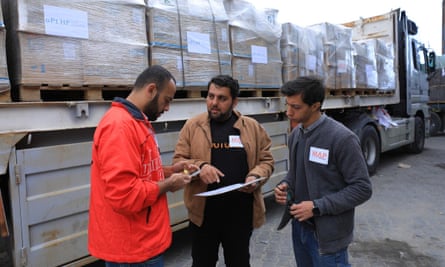My family has fled Rafah for yet another ‘safe’ area. By now we know there is no such thing
This is the ninth time we have been displaced. In this ‘humanitarian zone’, we can hear bombing and shooting all around us
am an aid worker, and my work involves supporting the local healthcare system and providing aid to communities around me. But like everyone in Gaza, I am also simply trying to survive. Until recently, I was sheltering and working in Rafah. I was forced to flee there from Khan Younis with my family, after the area was designated as a “humanitarian safe zone”. Yet it was not long until the Israeli military began its invasion of Rafah, and we were forced to move again after Israel’s evacuation orders.
The situation in Rafah is now utterly chaotic. People do not know where to move to, and are terrified of going somewhere else that will get bombed. Just days after the international court of justice ordered Israel to halt its military offensive there, the Israeli army fired missiles at a tent encampment in a “safe zone” of west Rafah, killing at least 45 Palestinians and injuring dozens more. This news was followed by shocking and abhorrent images showing burned and dismembered bodies, including those of children. On Tuesday, more Israeli army airstrikes reportedly killed 21 displaced Palestinians in al-Mawasi, another so-called safe zone, where Israeli authorities had apparently told Palestinians to flee.
As I write this, Israeli soldiers and tanks are advancing deeper into Rafah while Palestinians, scared for their lives, have nowhere to go.
I had already been displaced eight times with my family, and we had to weigh up our options. It is an incredibly difficult decision to flee with your family, and you must think about whether you should move, as you were told the place you are in was safe. The time to make a decision is very short. You are forced to leave belongings behind and never know where you will be going next.

I am now in Deir al-Balah, in central Gaza, where about 1 million people have fled from Rafah in the past three weeks. We were told this was a safe humanitarian area, but we hear bombing and shooting happening all around us. There is no access to shelter, hygiene kits or dignity kits for displaced families here, and overcrowding has resulted in a shortage of tents.
This chaos makes providing medical care to people unfathomably challenging. Since October, Israel’s indiscriminate military bombardment of Gaza has put 20 hospitals out of service. Now, only 16 are partly functional, and this could change again by tomorrow. All medical facilities lack critical supplies, staff and medicine, and are operating at breaking point.
On Monday, two medical staff were killed by an Israeli tank at the Kuwaiti hospital in Rafah, which has now been forced out of service. Field hospitals in western Rafah, set up to treat the huge influx of injured people, including the Indonesian field hospital, have also now been forced to close.
Healthcare workers and injured patients have even been trapped in hospitals across Gaza. Israeli military action has made it incredibly difficult for ambulances to move or reach patients, and I have heard reports from medical workers of Israeli quadcopters (small armed drones) targeting ambulances. No one is safe from attack.
Think for a minute about what it means to have to quickly evacuate a hospital. You must shut down services and there is chaos as often the hospitals are under siege or bombardment, with floods of people desperate to get medical care, support their loved ones or find shelter. You have to move patients who are critically ill, often without an ambulance, and then they are put at risk of attacks by snipers, drones or airstrikes. The lack of communication makes it difficult to even tell people where they should take injured people instead. As a result, more people are killed.
This health and humanitarian disaster has been compounded by Israel’s closure of the Rafah crossing for more than three weeks, effectively strangling the entry of much-needed food and medical aid. My colleagues in northern Gaza tell me that there is now only one functioning hospital there, which could shut down any day due to a lack of fuel.
The border closure means medical staff cannot enter, and hundreds of critically ill and injured patients who need medical treatment outside are trapped in Gaza. There is currently no burns unit in Gaza, as well as extremely limited cancer and dialysis treatment and maternity care services. If Israel does not let adequate amounts of aid in again, more civilians will die, and in painful ways without proper treatment.
The uncertainty and fear of danger is a constant stress; we are all terrified and exhausted. Nobody knows where to go or what to do. As an aid worker, I would love to be able to properly conduct my work and help the lives of people in need. This is not possible. It will never be possible until we have an immediate and permanent ceasefire in Gaza.
We are witnessing new levels of inhumanity in Rafah, and these will be repeated until Israel complies fully with the international court of justice’s orders and halts its military offensive.
Mohammed Al Khatib is a senior programme manager for Medical Aid for Palestinians (MAP) in Gaza. This article was co-produced with his colleagues in London, based on WhatsApp messages and voice notes. The situation on the ground in Rafah is rapidly changing. This article was written on 28 May with the information that Mohammed had at the time



